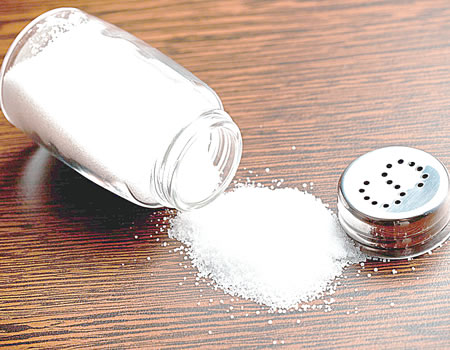Kidney conditions prevalence cuts across all ages, all races but the extent of affectation differs. In this report by Sade Oguntola, experts say lifestyle modification, including reduction in salt intake, may protect from kidney problem.
Many families have lost their loved ones to kidney-related illnesses in recent times because of sheer ignorance and to a greater extent, cost.
Despite the enormity of sorrow this illness has caused many homes, many things wreak the kidney including eating too much of salt.
As important as salt is to normal body functions, this can damage the kidneys along with the heart and aorta. Salt intake may also raise blood pressure, which can cause damage to the kidney’s nephrons, which filter wastes.
“Most people who take too much of salt do not admit it because they had gotten use to it. It is the cheapest food item, but the one that we abuse most,” said Dr Samuel Ajayi, a consultant nephrologist, University of Ibadan, Oyo State.
The kidneys control fluid balance and blood pressure by controlling the amount of fluid lost from the blood into urine. A high salt diet can disrupt the function of the kidneys and cause high blood pressure; this in turn puts a strain on the kidneys leading to kidney disease.
If kidney disease is left untreated and the blood pressure isn’t lowered, the damage can lead to kidney failure. This is when the kidneys are no longer able to filter the blood and the body slowly becomes poisoned by its own toxic waste products.
This can cause swelling in the ankles, vomiting, weakness, poor sleep, and shortness of breath. Without treatment, the damage can get worse, and the kidneys may eventually stop working. This is serious, and it can be life-threatening.
Dr Ajayi declared, “We usually advise people who are hypertensive to reduce their salt intake because there is the tendency for their blood volume to expand and as such the blood pressure goes up. Too much salt is not good.”
A high salt diet can also cause existing kidney disease to progress faster. People with kidney disease, or at risk due to persistent urinary tract infections or Chrohn’s disease, are also enjoined to reduce their salt intake to avoid exacerbating the condition.
Unfortunately, many other food items like sugar can actually harm the kidneys, too. “Sugar, in its different forms, including from excess caloric intake either in form of drinks or food as one grows older build up as weight. And then people tend to become diabetic; some hypertensive. Both are recognised causes of kidney disease,” said Dr Ajayi.
Moreover, at the 2013 ASN Kidney Week held at the Georgia World Congress Centre in Atlanta, researchers indicated that consuming at least two bottles of soft drinks per day is linked with proteinuria or increased excretion of protein in the urine, which is a hallmark of kidney dysfunction.
Is energy drink better for a healthy kidney? According to Dr Ajayi, “People really do not need them in many cases because of the caffeine in them that they feel will make them feel good and strong, but this eventually could damage their kidneys, even the liver, over time,” Dr Ajayi added.
Consuming red meat harming kidney
Eating proteinous foods is healthy, but this also depends on the kind of protein. Taking lots of red meat may cause a problem. But healthy people will simply not develop a disease if they take certain healthy protein.
In truth, “eating three small pieces of meat is not excess for healthy people when compared with what some people take in some countries. As such this is not enough reason to develop kidney problems,” he said.
Recently, a large study from Singapore suggested that eating red meat may boost the risk for kidney failure, but swapping even one daily serving of red meat for another protein may reduce the risk. The 2016 study was published in the Journal of the American Society of Nephrology.
They suggested that fish/shellfish and poultry are better alternatives to red meat, adding that replacing one serving of red meat with another protein, say poultry, can reduce the risk of kidney failure by up to 62 per cent.
Although diabetes and hypertension are major culprits of kidney disease, he added that long term use of NSAIDs (nonsteroidal anti-inflammatory drugs)like ibuprofen for pain relief, for instance by persons with arthritis can also damage the kidneys.
In addition, herbal medication and mercury containing creams and soaps as well as excessive loss of blood can cause damage to the kidney.
Individuals with health conditions such as cholera, dysentery and excess vomiting because of loss of high body fluid can also predispose to kidney problem
Ironically, in healthy individuals, not drinking sufficient water or holding urine on for too long may actually not cause kidney damage. According to him, “it is good to take plenty of water every day because it keeps one healthy generally; it also keeps the kidneys working.
“If you do not take enough fluids, especially in environments like the Northern Nigerian, the urine becomes concentrated and coloured. Some of the constituents of the urine may even form kidney stones, and requiring increased intake of water to correct.
“I would not want to perpetrate what is not true that people holding their urine and not passing it out frequently will have kidney disease. Sometime people hold their urine if they are in an environment they could not easy pass it out, this will not necessarily cause kidney problem.
“But if there is an obstruction to passage of urine, maybe due to an illness or prostate enlargement, that may cause some problem. As they retain more urine in the bladder, the bladder being muscular in nature gets bigger and bigger to accommodate more urine that is obstructed. The back pressure effect of this eventually causes damage to it.”
However, in some instances, a traumatic injury with blood loss, such as in a car wreck, complications during a pregnancy, such as eclampsia and pre-eclampsia and some severe infections can damage the kidney.
In protecting one’s kidneys, Dr Ajayi urged regular checks of blood pressure and sugar, which are the major causes of kidney problem in Nigeria just as well as adherence to medication in those with these medical conditions.
“If we address diabetes and hypertension, our hospital beds will not be filled with patients requiring dialysis and kidney disease. These are preventable causes of kidney problems that are common in Nigeria, “he concluded.
WATCH TOP VIDEOS FROM NIGERIAN TRIBUNE TV
- Let’s Talk About SELF-AWARENESS
- Is Your Confidence Mistaken for Pride? Let’s talk about it
- Is Etiquette About Perfection…Or Just Not Being Rude?
- Top Psychologist Reveal 3 Signs You’re Struggling With Imposter Syndrome
- Do You Pick Up Work-Related Calls at Midnight or Never? Let’s Talk About Boundaries







